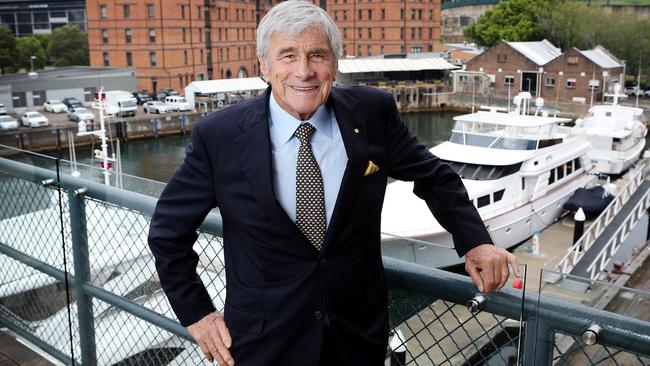Seven stake turns up heat on Boral board
The Kerry Stokes-controlled Seven Group is expected to hold talks with Boral’s board after snapping up a 10 per cent stake.

The Kerry Stokes-controlled Seven Group Holdings is expected to hold talks with Boral’s board after snapping up a 10 per cent stake in the building materials giant, potentially strengthening a push by investors for a strategic overhaul at the company.
Seven used the cover of a major MSCI index rebalancing on Friday to buy 122 million shares in the under-pressure construction group, handing it both exposure to an infrastructure-led recovery out of COVID-19 and also influence on the future direction of the company after a string of profit downgrades.
While Seven has no plans for a bigger corporate raid on Boral, its emergence as one of the company’s biggest shareholders will likely see chairman Kathryn Fagg invite Mr Stokes and his son, Seven chief executive Ryan Stokes, to a meeting to understand the high-profile investor’s intentions.
The share purchase, confirmed in an ASX lodging late on Tuesday, emerged less than two weeks after The Australian revealed Boral’s institutional investors had discussed a plan to shake up its board as concern grows over the group’s underperformance and strategic direction.
Its major investors include Legg Mason, Argo, John Wylie’s Tanarra Capital, hedge fund L1 Capital and Perpetual, which has become a substantial shareholder with a 5.49 per cent stake.
Several of Boral’s top 10 investors have been in discussions on the topic of board renewal ahead of the departure of long-serving chief executive Mike Kane in August after its annual results. Several have been agitating for the company to consider selling its US building products business after a period of poor performance since it was acquired for $3.5bn in late 2016.
Shareholder Allan Gray said there was a desire among investors for change, which could grow with the emergence of a major new shareholder on the register.
“I suspect all shareholders are very keen for some change,” Allan Gray managing director Simon Mawhinney told The Australian. “That’s both in terms of how capital is allocated going forward, and potentially they may be positively disposed to other changes. The company’s management and board are operating on borrowed time anyway.”
A second major shareholder said the addition of one of Australia’s best-known business identities could spark more rapid change at Boral. “The register now is full of agitators, so the chairman is going to have to do something concrete. There is some easy stuff to do in the US for a start,” the investor said.
Boral’s shares rose 6.3 per cent to $3.53 on Tuesday after jumping more than 12 per cent in intraday trade. The stock has endured a rollercoaster year, hitting $5.20 on February 6 before sinking by two-thirds to $1.79 on March 23 as profit hits and the COVID-19 pandemic caused market jitters.
Seven Group boss Ryan Stokes has signalled for the past year a focus on potential deals in infrastructure, mining services and energy where it sees strong growth opportunities spanning both the east and west coast.
Seven has bought stakes in listed companies in the past as investments, including Beach Energy, Estia, Telstra and Woodside Petroleum, among others.
The conglomerate owns a diverse range of Kerry Stokes’ interests, including a controlling Seven West Media stake, Caterpillar dealerships in NSW, Western Australia and the ACT, Coates Hire and a 30 per cent Beach Energy stake.
Seven was attracted to Boral’s strong position in the Australian construction materials industry but is understood to be less interested in its US exposure and may be open to a potential break-up of the group should other investors mount a push for change.
Seven Group has $803m of undrawn facilities and cash, with $430m committed. Its next substantial refinancing is due in 18 months. The company also retains a $300m “crisis liquidity buffer” to ensure the company can keep operating through any government-mandated actions.
The industrial services, energy and media conglomerate withdrew earnings guidance for 2020 on April 8 after its media arm was hit by falling advertising from COVID-19, while an oil price rout lowered energy earnings.
Seven had previously guided for high single-digit growth for the 2020 financial year.
Despite the economic slowdown, WesTrac year-to-date revenue is up 15 per cent. Coates Hire’s revenue so far this year is up 3 per cent on the prior period, but down 1 per cent on budget due to the COVID-19-linked fall in events revenue.
Additional reporting: Bridget Carter


